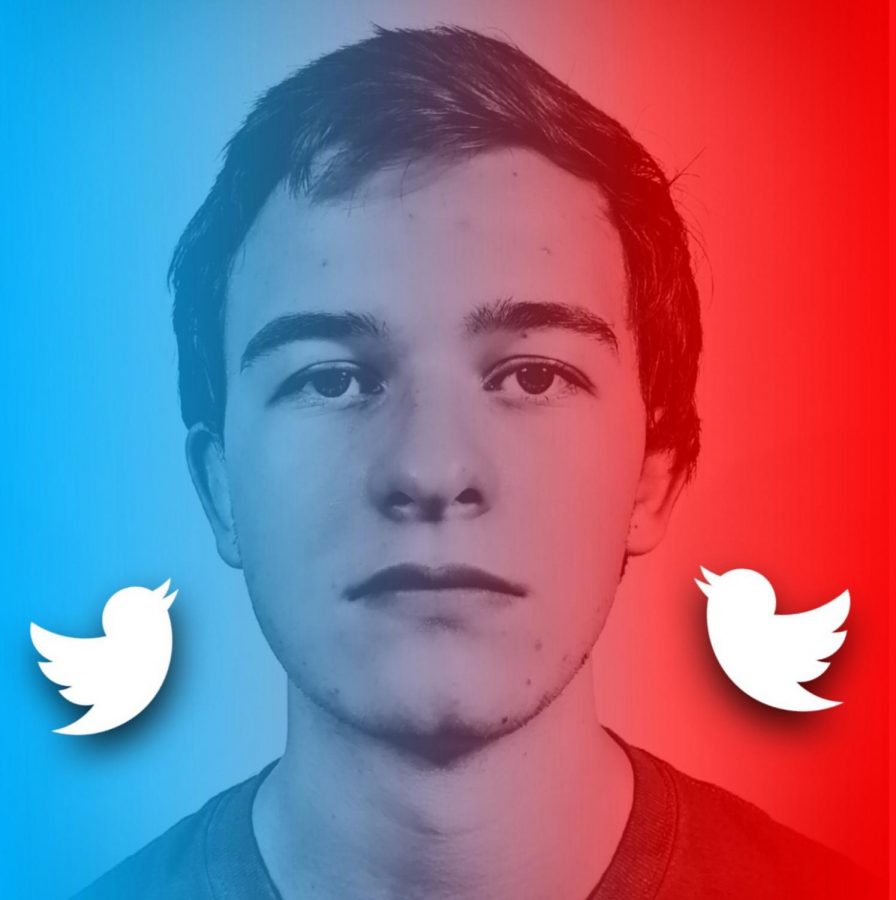Tweeting left and right
Twitter impacts teenagers’ political views
Photo by Photo by Sasha Kek
Twitter has gained popularity among teenagers with 32% of US teens active on the app looking to stay up-to-date with current information. “The ability to be able to talk to other people because humans are naturally social, and the ability to literally just have the whole world in your pocket is what gives social media the impact it has,” Rudy Tabachnik, right-leaning junior, said. “Twitter is just the front runner. You also have all of your celebrities on Twitter, you have a lot of politicians on Twitter, you have all the pundits on Twitter, you have even crappy meme accounts on Twitter; everything’s on Twitter and that’s just how it works.”
For the 32% of teenagers who use Twitter, 0% should rely on it as their only news source, say local teens. While the social media app is convenient, users need to be aware of the possibility of bias, said Rudy Tabachnik, a self-described right-leaning junior who is politically active on social media. Tabachnik warns Twitter may not be the best way to get credible information..
“[Dependence on social media] stems from living with social media your whole entire life,” Tabachnik said. “You’re so used to having quick information that you use Twitter as a source because you think the reactions you get, how fast the responses are, that something about it is correct. You can’t use social media as a source because of how reactive it is, and it doesn’t go based off of facts all the time, but more or less goes off impulses and bandwagons because of how reactive it is.”
With the president’s presence growing on Twitter, “less and less has been about Trump’s policies and more about what he said on Twitter; it’s never focused on policies,” Tabachnik said, which he argues has started to politicize the platform.
“The reason social media has become so politicized is because it’s just very easy access to politicians,” Tabachnik said. “All you have to do is set up an account, ask to be verified by Twitter because you’re a political figure, boom! You have your platform to show your opinions on or your political ads. That was the whole point of social media; it’s an easier way of reaching out to other people and making more connections.”
Considering that Twitter is an open platform to share opinions on, students like Grace O’Malley, a self-described left-leaning senior, can use the app in order to stay up to date in the political world.
“I would say I am a very political person and I use [Twitter] to see people’s opinions on what’s going on,” O’Malley said. “It just keeps me knowledgeable, [but] I don’t usually get direct information from Twitter because it can be very unreliable and a lot of the time it’s not fact-checked. I know a lot of teenagers don’t care about politics and choose to stay out of it, but the ones who do, I think that they use Twitter a lot just because it’s such an easy app.”
While Twitter is an easy application to use, Tabachnik says the platform is not a fair representation of both political sides in his experience as he says, “most social media are very left-leaning, as for most of culture and society.”
“It’s kind of like how the Soviet Union had their normalization and destabilization, and that would lend itself to people becoming more left-leaning. Same thing with social media: if it’s through recommendations, if it’s through accounts to follow, [social media] poke you in the direction that they want you to go,” Tabachnik said. “They give you the information that they want you to see.”
Putting representation aside, O’Malley disapproves of the two parties because the system “can mess up who you’re voting for,” O’Malley said, as someone may not agree with all the policies of a particular party.
“I hate the two-party system because sometimes people, even including myself [when I can vote], will just vote for whoever’s on that certain party,” O’Malley said. “In the next election, I am just going to try to look for what the presidential candidates’ views are on the issues that affect me and affect other people. [I will] try to be unbiased and not use the Republican and Democrat system, [otherwise] I’ll mess up [my vote].”
No matter their political opinions, both O’Malley and Tabachnik recommend doing your own research into politics rather than using Twitter as a main source “because if I only see one side, I’m biased, and that’s never a good way to agree or disagree with something,” Tabachnik said.
“Twitter gives me the ability to challenge my ideas or tell me that my ideas are right because here’s the thing, some people on social media live in a rabbit hole, right? All they hear is their opinion and nobody else’s, and when somebody tries to dispel their opinion, they get really upset,” Tabachnik said. “The only reason that I would use Twitter is either A: quote a politician’s reaction, or B: quote the President’s reaction, so it’s never to use as information.”

This is Sasha’s third and final year working with the Bear Facts staff as the LZ Life Editor. Aside from helping Bear Facts run smoothly, you can find...

